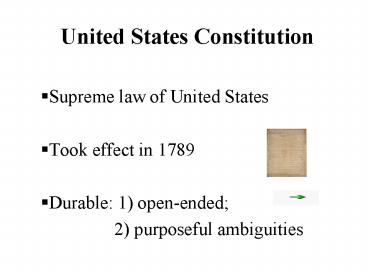United States Constitution - PowerPoint PPT Presentation
1 / 22
Title:
United States Constitution
Description:
United States Constitution Supreme law of United States Took effect in 1789 Durable: 1) open-ended; 2) purposeful ambiguities – PowerPoint PPT presentation
Number of Views:159
Avg rating:3.0/5.0
Title: United States Constitution
1
United States Constitution
- Supreme law of United States
- Took effect in 1789
- Durable 1) open-ended
- 2) purposeful ambiguities
2
Results
- Rule Interpretation
- Precedents
- Actual text of Constitution
- Assumed intent
- (discretion limited)
3
BRANCHES OF GOVERNMENT
- Article 1 Legislative Power
- House
- Senate
- Manner of Election
- Qualifications of Members
- Legislative Procedure (outline)
- Indicates power establishes limits on Federal
and state legislative powers
4
Powers of Congress
- Regulate Commerce
- Declare war
- Raise an army
- Make laws ---
- elastic clause gives Congress the
- power to make all laws necessary
- and proper for carrying into execution the
foregoing powers.
5
Article 2 Executive Powers
- President/Commander-in-Chief
- Procedures for selection
- Qualifications for office
- Oath
6
Executive Powers (cont)
- 5. Powers Duties
- 6. List of succession
- 7. Impeachment removal processes
7
Executive Powers
- Appoint Federal officers (removal?)
- Sign laws
- he shall take care that laws be faithfully
- executed
8
Article 3 Judicial Power
- Outlines Court System including Supreme Court
- Congress can create lower courts reviewable to
Supreme Court - Requires trials by jury for all criminal cases
- Defines treason (Congress administers punishment)
9
- Specifies that certain cases the Supreme Court
has original jurisdiction and for others it has
appellate jurisdiction
10
Remaining Original Articles
- Article 4 dealt with intergovernmental relations
and federalism. - Article 5 provided an amendment mechanism so the
Constitution could be updated to meet future
needs and changes. - Article 6 announced the supremacy of the
Constitution and requirements for ratification
11
The Bill of Rights
- Idea of anti-federalists
- Anti-federalists v. Hamilton
12
First Amendment
- Congress shall make no lawabridging the freedom
of speech. - --Schenck v. United Statesrestrictions against
obscenities, fighting words and other
controversial forms - Symbolic gestures?
13
First Amendment (cont)
- Freedom of the press
- not absolute (example libel)
- Reporter/source confidentiality?
- Branzburg v. Hayes
- 3. Prior Restraint
14
First Amendment (cont)
- Freedom of Religion
- Not absolute (example polygamy)
- Vast amounts of case law
15
Second Amendment
- A well regulated Militia, being necessary to the
security of a free state, the right of the people
to keep and bear Arms, shall nto be infringed.
16
Third Amendment
- Provides that no soldier shall be quartered in
any house in peacetime without the owners
consent - Collective right v. Unlimited right
- Objection to Englands general warrants and writs
of assistance
17
Fourth Amendment
- Prohibits unreasonable searches and seizures
- Warrants must particularly describe the place to
be search and the person or things to be seized.
probable cause
18
Fourth Amendment (cont)
- Changes in world and application
- Patriot Act,
- Electronic surveillance,
- Cell phones,
- E-mail?
19
Fifth Amendment
- Prohibits double jeopardy, protection against
compulsory self-incrimination - Does not outline due process though
- Says private property shall not be take for
public use without just compensation
20
Remaining Amendments
- Sixth/Seventh Amendments provides for a speedy
trial by an impartial jury and the assistance of
counsel - Eighth Amendment prohibits excessive bail and
excessive fines and prohibits cruel and unusual
punishments
21
Remaining Amendments
- Ninth Amendment the enumeration in the
Constitution of certain rights shall not be
construed to deny or disparage others retained by
the people. - Tenth Fourteenth Amendments Addresses
federalism and state rights
22
Summary
- The Constitution grants powers to a government
and limits those powers by specifying that
individuals will retain certain rights. - Language most imprecise
- Constitution more than 200 years oldliving
document - New frontier and possible effects































